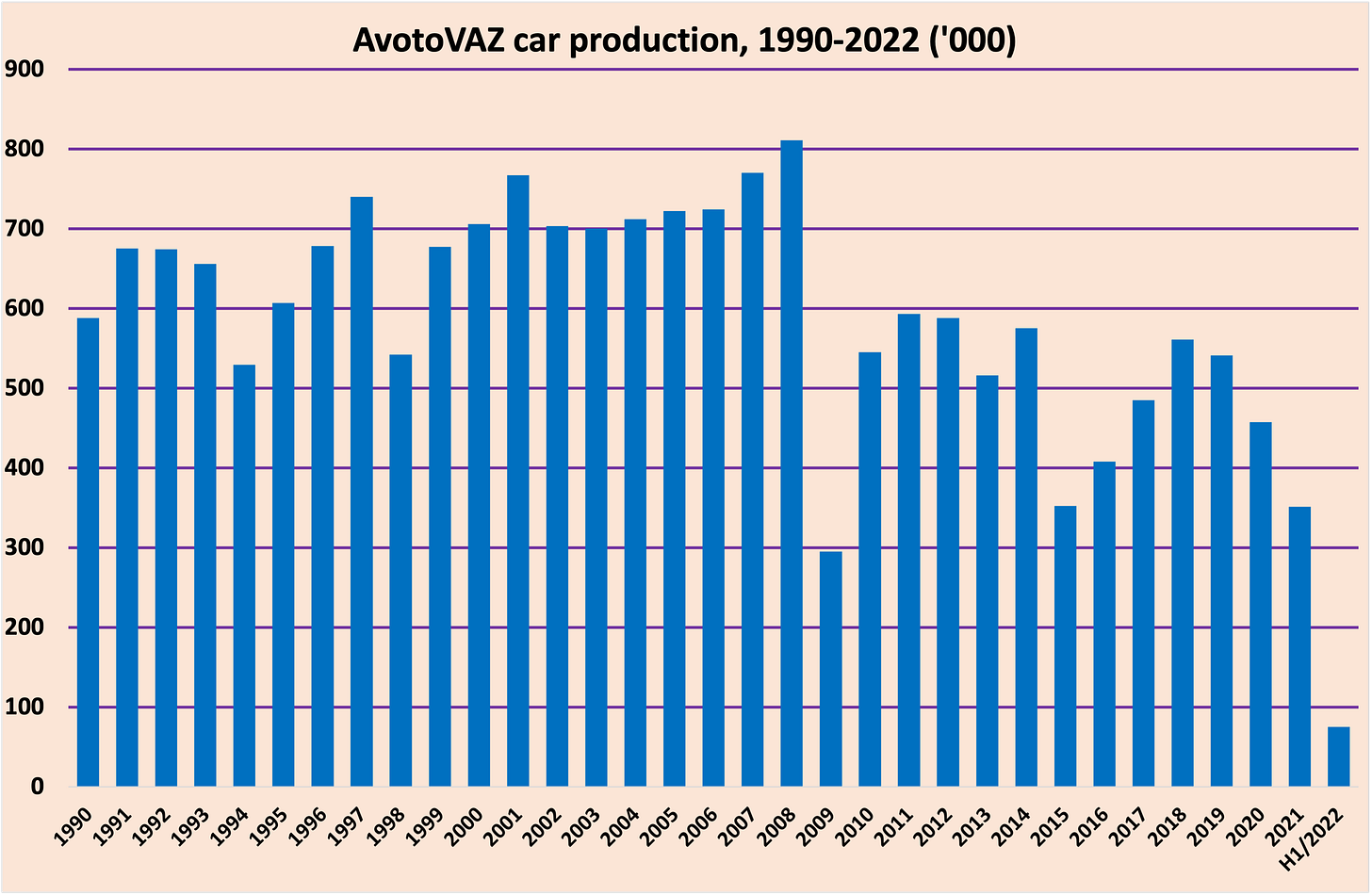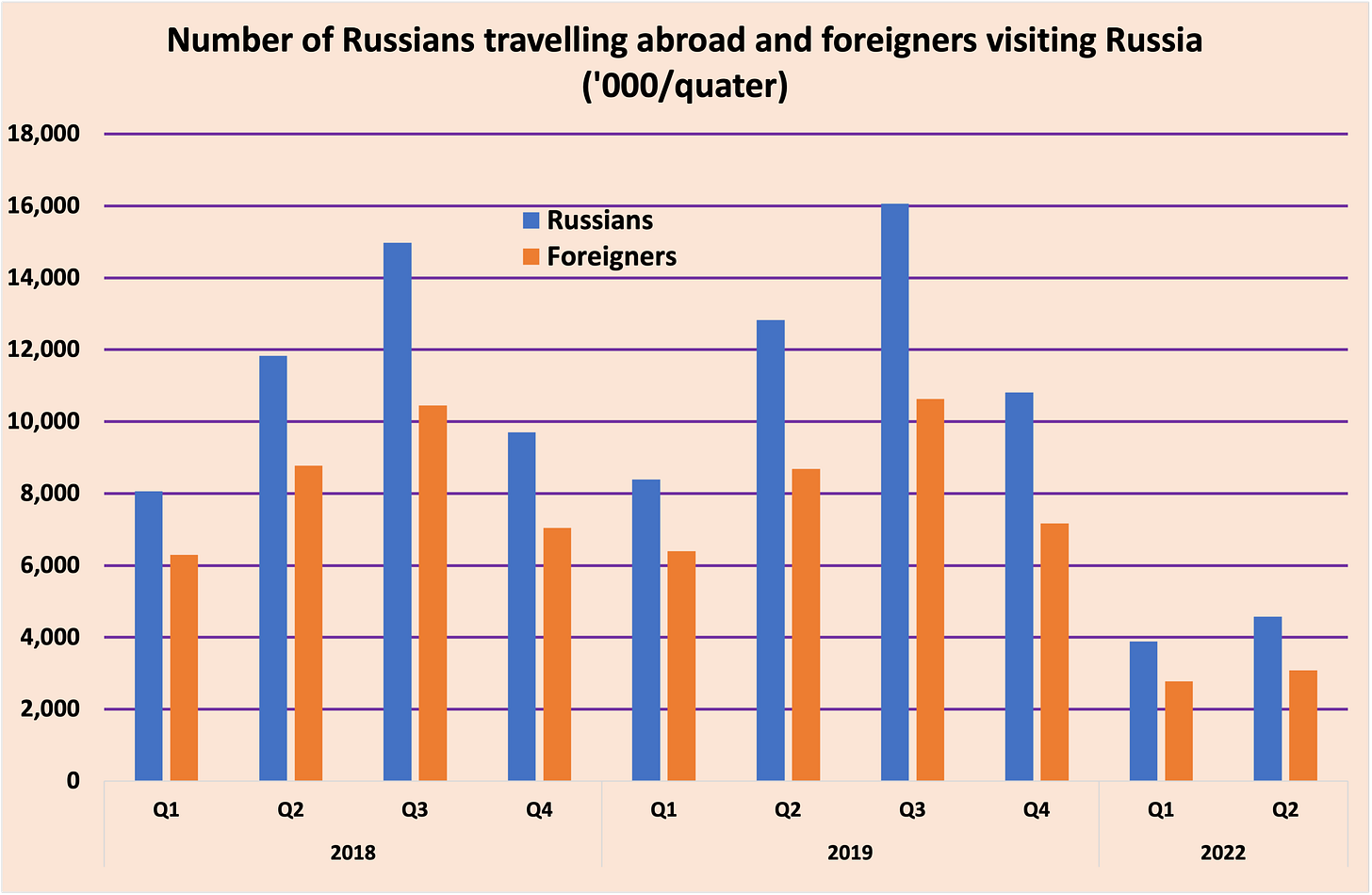August 3, 2022
The main thing is not to make the President worried
Rotenberg will help
Someone will be able to make profits
Generous Kremlin
Neither way
Hiding, hiding, and...lost
The partnership is over
Mosaic
The main thing is not to make the President worried
The new head of AvtoVAZ, Russia’s largest passenger car manufacturer, Maxim Sokolov, previously a minister in the Russian government, knows Vladimir Putin’s tastes well. In particular, he knows that the Russian President does not like to receive information about dismissing employees at large companies, especially those controlled by the state.
After the former controlling shareholder and technology partner of AvtoVAZ, the French concern Renault, ceased its activities in Russia, car production at AvtoVAZ collapsed 4 times compared to 2021, and today Maxim Sokolov and the Ministry of Trade are struggling to find components to produce cars with the minimum possible equipment. The design capacity of AvtoVAZ, after the investments made by Renault, is 1.4 million cars per year, but the company has not produced more than 600,000 cars since 2014. In such a situation, the natural desire of the head of the company should be to reduce some of 375 miles north-east from the main complex in Togliatti), which the government forced the company to acquire in 2011, is objectively excessive.
The AvtoVAZ Board of Directors has said it is working on a new development strategy, which is due to be approved in August/September, to determine the parameters for using the production sites in Togliatti and Izhevsk. Although the company management claims there will be no mass layoffs at the Izhevsk plant, and that the plant’s capacities will be used to produce new models, workers do not always trust these promises—they have been idle for the past five months, receiving minimal compensation.
To protect the interests of its members, the trade union of Izhevsk plant workers sent a letter to Vladimir Putin, expressing concern about the situation and asking the President to pay attention to what is happening in the company. Without waiting for Putin to convene a meeting on the automotive industry, Maksim Sokolov decided to take the initiative and encourage employees to resign voluntarily: Those who leave voluntarily will be offered permanent jobs at other enterprises in the city and region with 5-7 months salaries as an exit bonus. Employees of pre-retirement age will be provided an exit bonus, 7 months salaries when they retire early.
Rotenberg will help
Marat Khusnullin, Deputy Prime Minister of the Russian government in charge of the construction complex, has received a new task from the Kremlin: To help the administration of the occupied Kherson region in solving its logistical problems.
The main one is related to the restoration of the Antonov Bridge across the Dnieper River in Kherson, which was damaged due to shelling by the Ukrainian military. The Russian army actively used this bridge to supply military units in Kherson, and its destruction greatly complicated the problem of providing the grouping on the right bank of the Dnieper. Khusnullin stated:
The bridge has just started [rebuilding the bridge]. I think that next week it will already be ready... The bridge was designed during the Soviet Union, and the information base about its design has been preserved. We found people who understand, and the database was found... We sent the best bridge construction company in the country, which builds the largest number of bridges and the most complex ones. This is the same company that built the Crimean Bridge. These guys are very professional; they have enough competence and experience. I personally talked to them; there’s nothing so scary there.
The Crimean Bridge was built by a company owned by an old friend of President Putin, Arkady Rotenberg.
Someone will be able to make profits
If the restoration of the bridge in Kherson is a budget-spending project, another problem that the Kremlin has instructed Marat Khusnullin to solve will have to be profitable: The deputy prime minister must organize the buying of grain in the Kherson region and export it to Russia. Because Russia is a grain exporting country, it is evident that Ukrainian grain will not be used for domestic consumption but sold for export.
During his trip to Kherson, Khusnullin suggested creating a state enterprise to buy grain and other agricultural products.
Discussed today the issue related to the export of agricultural products. So far, this work has not been adjusted to the end; there is something to work on. Probably, we will still create a regional SUE, which will directly carry out the purchase of products.
Who will finance the purchase of grain and who will profit from its sale, the Deputy Prime Minister did not say. In addition, he commented that he discussed the creation of a state trucking company to export products to Russia. However, as long as the occupation administration did not have its fleet of cars, Khusnullin suggested issuing special passes to Ukrainian drivers, allowing them to go to the territory of Russia.
We agreed today that we will give special passes to travel through all territories—both new territories and the territory of Russia.
Generous Kremlin
The Kremlin does not intend to be stingy in spending when carrying out the annexation of the occupied part of Ukraine. The administration of the Kherson region has sent a request to Moscow to allocate 6 billion rubles for paying pensions and salaries to state employees—this became known after a meeting held in Kherson by Deputy Prime Minister Khusnullin.
Before the war, a little more than 1 million people lived in the Kherson region of Ukraine; if we assume that 1) 70% of the population remained in the occupied territories, 2) monthly spending on salaries and pensions will remain at the same level, and 3) payment of salaries and pensions will constitute half of the budget spending, then by the level of per capita spending, the Kherson region will surpass 70 of 85 Russian regions.
But do not think this burden will be overwhelming for the Russian budget: The final amount (6*12*2 = 144 billion rubles) will not slightly exceed 0.5% of Russia’s federal budget expenditures for 2022.
Neither way
The invasion of Ukraine by the Russian army, as was entirely expected, led to a sharp decline in international travel by Russians and foreigners visiting Russia.
In the second quarter of this year, Russians traveled abroad 2.7 times less than in 2018-2019, the number of business trips decreased 1.6-2 times, and the number of tourist trips decreased 4-4.4 times. The geography of Russians’ trips abroad has sharply shrunk: Abkhazia and Turkey accounted for almost half of the total; in 2018-2019, these countries also led the list, but their combined share was nearly half (26%). In 2022, eight countries accounted for 80% of trips (19 countries in 2018-2019). Hungary (30 times reduction), Spain, Cyprus, the United States, the United Kingdom, and Cuba (10 to 15 times drop) were the most brutally hit.
The number of foreigners coming to Russia in the second quarter decreased 2.8-fold compared to 2018-2019, with the number of tourists decreasing 50-fold compared to 2018 and 63-fold compared to 2019. The number of visitors from the United States, Great Britain, South Korea, and Finland decreased the most (40 to 58 times). In 201819, 80% of the arrivals were from 16 countries; in 2022, it was six, all former Soviet republics.
Hiding, hiding, and...lost
After the imposition of massive sanctions by Western countries, the Russian government decided to drastically limit the number of economic statistics so that Western countries could not assess the strength of the sanctions pressure. I do not know about Washington and Brussels, but I have enough statistics to make my assessment. Yet, as it turned out, the Russian government has deprived itself of the ability to control the expenditures of state companies.
The Ministry of Finance summed up the results of purchases made by the government and state-owned companies in the first half of 2022, and the aggregate data regarding state contracts brought no surprises: Although the number of contracts slightly decreased from 1.7 million in the first half of the last year to 1.6 million, their total value increased by 17.5%, which can be well explained by inflation (according to Rosstat, the GDP deflator for the first quarter was 20% by year-end).
According to the adopted anti-sanctions law, the state-controlled companies hit by the sanctions received the right to classify the data on their purchases and not transmit it to the state information system. As a result, the Ministry of Finance was surprised to find that although the total number of contracts signed by state companies in the first half of the year almost did not decrease in comparison with 2021 (790,000 vs. 806,000), their total value fell by more than half, from 11.5 trillion to 5.5 trillion rubles. It turns out that the most expensive contracts signed by state companies were hidden from government control.
The Finance Ministry promised that this “window of opportunity” would be closed next year—the President has already signed the relevant law. However, state companies will have to transfer information about their contracts to the state database starting on April 1 next year. Thus, nothing prevents them from concluding the most expensive contracts in the first quarter and therefore avoiding the government’s control again.
The partnership is over
On August 2, the Office of Foreign Assets Control (OFAC, a division of the U.S. Treasury Department) put several Russian individuals and companies on the sanctions list (SDN, Specially Designated Nationals list), including Skolkovo Foundation, Skolkovo Technopark, and Skoltech. Including these companies in the SDN list implies a ban for U.S. companies and individuals on any interaction with them, including the provision of technology. This decision will seriously complicate the development of telecommunications equipment for 6G communications, the Kremlin hoped.
Today in the Russian market, more than 95% of telecommunications equipment is installed under the so-called proprietary (closed) model, when the supplier makes all network elements on the equipment of one manufacturer (Huawei, Ericsson, Nokia, ZTE). As of 2019, “Skoltech” is developing telecom equipment on the OpenRAN architecture for 4G and 5G base stations as part of an international alliance. Successful implementation of this project will allow the use of compatible components and technologies from different manufacturers.
Theoretically, Skoltech can maintain access to the results of the international alliance: For open architecture, a complete description or description of the parts that the developer or integrator wants to share is published. But sometimes, open architecture business processes may require licensing agreements, which would be impossible for companies under U.S. sanctions to access.
Mosaic
The Ministry of Industry announced the main target of the Russian metallurgy development strategy discussed last week at the meeting with Vladimir Putin: By 2030, the production and export of Russian metals should return to the level of 2019.
As I told you, achieving this goal will be the task of various ministries and departments, who will have to develop projects involving increased metals consumption. In terms of macro indicators, this policy will lead to an increase in specific consumption of primary resources—i.e., will move the Russian economy in the opposite direction compared to developed countries.
According to NielsenIQ, the range of goods available to Russian consumers narrowed noticeably after the Russian army invaded Ukraine: In food categories by 10%, and in non-food categories by more than 20%.
The Chinese company Huawei stopped accepting orders for its products on its Russian website and mobile app.
“With the participation of the International Committee of the Red Cross, it was possible to organize a dialogue with Kyiv on the exchange of prisoners of war and bodies of dead servicemen. So far, 27 such operations have been carried out,” Russian Deputy Defense Minister Alexander Fomin said.






